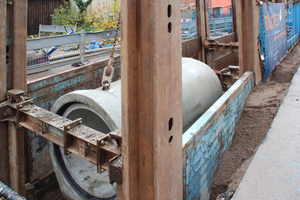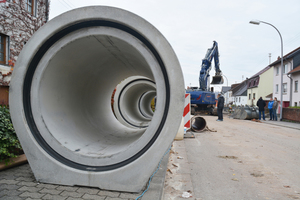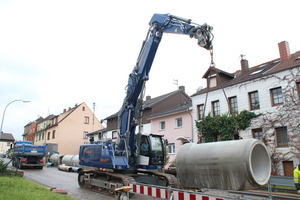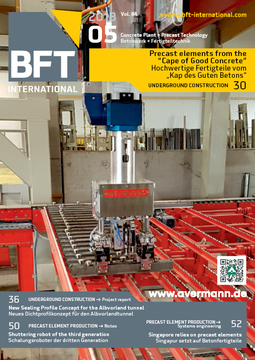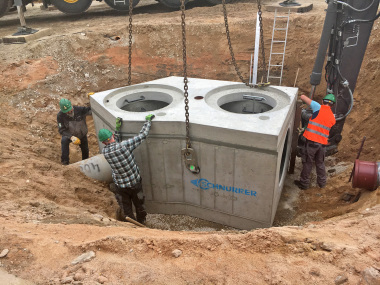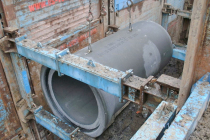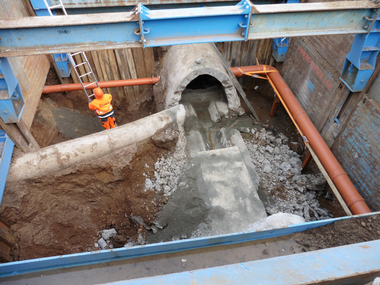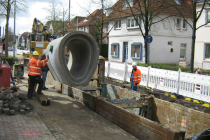Perfect Pipe – sustainable pipes for Saarbrücken
At the very latest since the last United Nations Climate Change Conference in Bonn in November of 2017, the topic of sustainability has again been brought to the center of our attention in the public discussion. Experts are in agreement that not only CO2 emissions, but rather in principle the consumption of resources must be reduced on a broad scale. For example, one approach consists in relying as much as possible on particularly long-lasting products. This course of action is particularly meaningful in underground infrastructure, because once such products have been installed underground; especially great expenditures of resources are required in the event of damages for reconstruction. One good example for the use of particularly long-lasting pipes can be seen in the restructuring sewage system around the “Ottenhausener Berg” in Saarbrücken-Gersweiler. A special reinforced concrete pipe system about 1 km in length was used, which fits the sustainability model especially well due to many factors.
Since June of 2016, the Central Municipal Waste Management Company (ZKE) has been working on the renovation of the sewers including the restoration of the road surfaces in the Saarbrücken district of Gersweiler. Project manager Dipl.-Ing. (FH) Michael Grün – in charge of sewer planning at ZKE describes the project: “As an owner-operated municipal enterprise of the state capital of Saarbrücken we are responsible for the operation of approximately 1,000 km sewer system within the city. Our perception of the situation at Ottenhausener Berg was that it was urgent for us to take action for two reasons: First of all, the old combined sewer line consisted of completely dilapidated ovoid pipes, which over the years, due to cracks had to be re-clinkered and repaired over and over again. Secondly, the existing ovoid pipes with nominal diameters of 600/900 and 800/1200 had insufficient capacity for the increasing severe precipitation events,” Grün said.
Combined sewer line with high chemical exposure
For these reasons, the only viable solution was a complete renovation of the sewer system. Dipl.-Ing. (FH) Marc Geib from local engineering office Geib describes the requirements for the pipe materials to be used: “As we are going to continue using a combined sewer line, we have to assume a high chemical exposure of the pipes for the future also. Therefore, the materials we use need to be as resistant as possible to biogenic sulfuric acid corrosion that could be caused by the wastewater.” However, along with chemical resistance, the statics of the pipes are also important. “We always prefer pipe systems that are able to withstand flexural stress well,” says Geib.
“Perfect Pipe” with increased sulfate resistance
Against this background and because a few years ago they had positive experiences in the district of Altenkessel with this system, the planning team is again relying on the reinforced concrete pipe system “Perfect Pipe” from Betonwerk Müller from Achern. ZKE-Construction Supervisor Dipl.-Ing. Hermann Rauch explains the reasons that spoke in favor of this system: “The concrete base pipe cast monolithically in one piece in accordance with DIN EN 1916 and DIN V 1201 is made of a tested, semi-compacting concrete C 40/50 with increased sulfate resistance up to= 1,500 mg/l. Thus, it has an increased resistance to chemical attacks and thus to biogenic sulfuric acid corrosion. The pipes hardening in the formwork (formwork hardening) also have a high dimensional accuracy,” says Rauch.
However, the pipe system has also proved to be particularly advantageous due to its good properties regarding statics.
FBS-Quality provides security
In addition, the quality guidelines for the production of the Perfect Pipe pipes speak for a durable quality. Project manager Michael Grün: “The ZKE requires that pipes and shafts made of concrete and reinforced concrete must be produced in accordance with the quality guidelines of the German Trade Association for Concrete Pipes and Reinforced Concrete Pipes (FBS). These are well above the standards and thus ensure an especially long service life of the pipes. Moreover, the FBS quality gives us the assurance that a certified quality is always being installed. Therefore, we can rely on the properties of the products used here with regard to tightness, load-bearing capacity and hydraulics.”
The FBS guidelines include a comprehensive factory production control and ensure continuous quality control from raw materials to production to the end products. In addition, a semi-annual third-party inspection by building authorities approved quality auditing commissions and testing institutes ensure compliance with high standards.
Reinforced concrete pipes – naturally sustainable
However, these reinforced concrete pipes do not contribute to sustainability only based on their durable quality, but rather also due to their environmental compatibility, because they can be easily recycled at the end of their service life and reused as construction material.
By the completion of the project in the spring of 2018, a total of 1,042 running meters of new reinforced concrete pipes will have been installed at Ottenhauser Berg. The work was performed by Backes Bauunternehmung AG & Co. KG from Theley, who hauled the concrete components weighing up to 7 t with a 36-ton excavator to the trench. The productive capacity of the new sewer system is at 6,000 l/s.
Finally, there is the matter of the costs. Project manager Michael Grün: “In total the project will cost around 3.2 million Euro. The surplus price for Perfect Pipe pipes compared to conventional material is around 2 %. This is a comparatively small additional charge, which is well worth the price when you consider how expensive it would be to renovate a defective sewer system after a relatively short time.”

